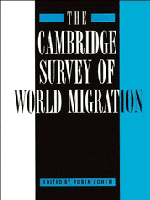Book contents
- Frontmatter
- Contents
- List of illustrations
- List of tables
- Notes on the contributors
- 1 Prologue
- 2 European colonization and settlement
- 3 Asian indentured and colonial migration
- 4 The great Atlantic migration to North America
- 5 Migration in Europe, 1800–1950
- 6 Migration in Africa
- 7 Latin and Central American migration
- 8 Migration to North America after 1945
- 9 Labour migration to western Europe after 1945
- 10 Repatriates and colonial auxiliaries
- 11 Migration in Asia and Oceania
- 12 Migration in the Middle East
- 13 Refugees from political conflict
- 14 Migrants and asylum-seekers in contemporary Europe
- 15 Emerging trends
- Acknowledgements and credits
- Index
14 - Migrants and asylum-seekers in contemporary Europe
Published online by Cambridge University Press: 05 December 2012
- Frontmatter
- Contents
- List of illustrations
- List of tables
- Notes on the contributors
- 1 Prologue
- 2 European colonization and settlement
- 3 Asian indentured and colonial migration
- 4 The great Atlantic migration to North America
- 5 Migration in Europe, 1800–1950
- 6 Migration in Africa
- 7 Latin and Central American migration
- 8 Migration to North America after 1945
- 9 Labour migration to western Europe after 1945
- 10 Repatriates and colonial auxiliaries
- 11 Migration in Asia and Oceania
- 12 Migration in the Middle East
- 13 Refugees from political conflict
- 14 Migrants and asylum-seekers in contemporary Europe
- 15 Emerging trends
- Acknowledgements and credits
- Index
Summary
‘Europe’ has always been less than the sum of its constituent parts. It is a curious regional description not least because no-one is quite sure where it begins or ends. The name ‘Europa’ first appeared in classical times when a Phoenician princess of that name was ravaged by the Greek god, Zeus. The classical use, oddly, then reverted to denoting Greece itself, first to distinguish the mainland from the islands, later to describe the full reach of Greek culture and civilization. By about 300 BC a koiné, or common Greek language, had emerged around the eastern Mediterranean. The Mediterranean basin was to provide the crucible for subsequent civilizations – the Roman, Judaeo-Christian and Islamic cultures intimately linking what we would nowadays call the Middle East, the Maghreb and southern Europe. I am aware how crudely the statement just made summarizes a very complex history, but the principal inference I want to draw is that ‘Europe’ could not be distinguished from ‘the Mediterranean’ until perhaps the end of the fifteenth century (Pirenne 1939; Braudel 1972/3).
The reference to ‘the end of the fifteenth century’ alludes to a crucial date – the capture of Granada from the Moors in 1492. (Ten years later Queen Isabella expelled all Muslims.) ‘Europe’ now became the zone of Christendom, particularly Western Christendom. The idea of a Christian, Western Europe was at the heart of the European ideology some five centuries later.
- Type
- Chapter
- Information
- The Cambridge Survey of World Migration , pp. 467 - 506Publisher: Cambridge University PressPrint publication year: 1995



